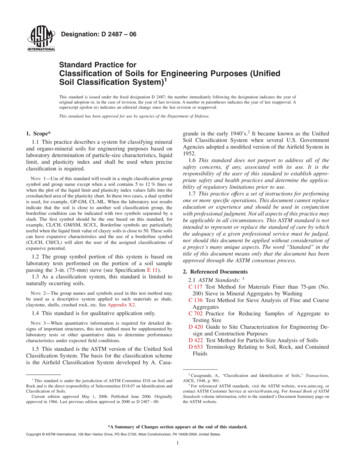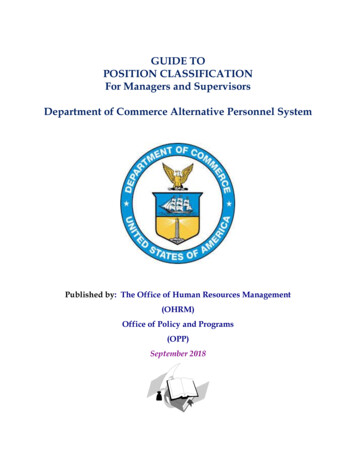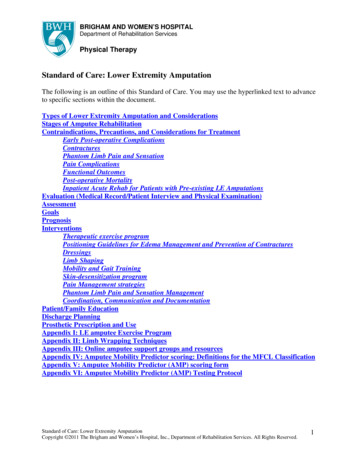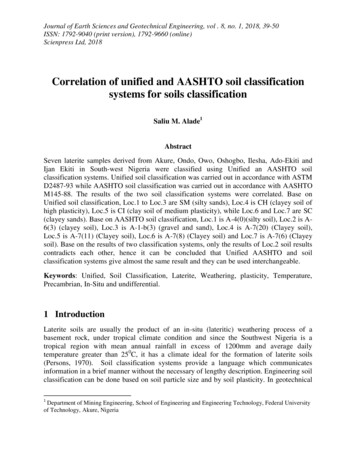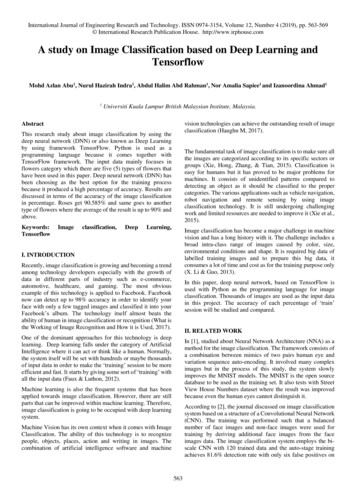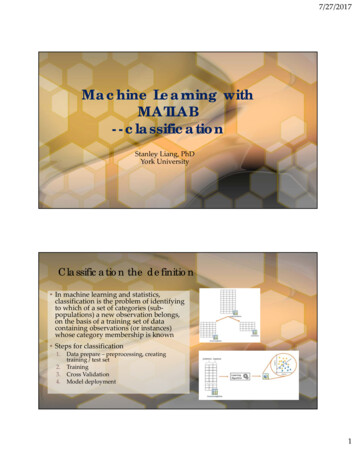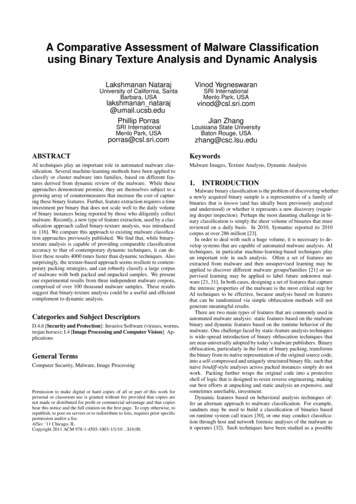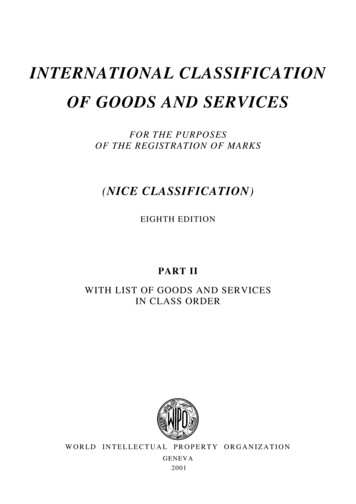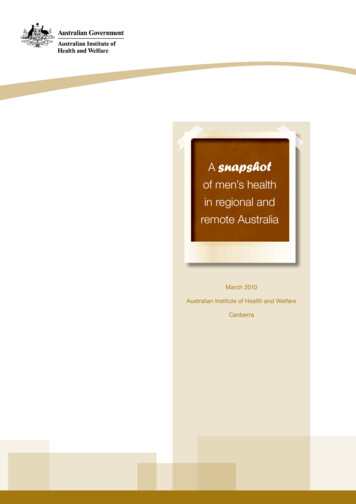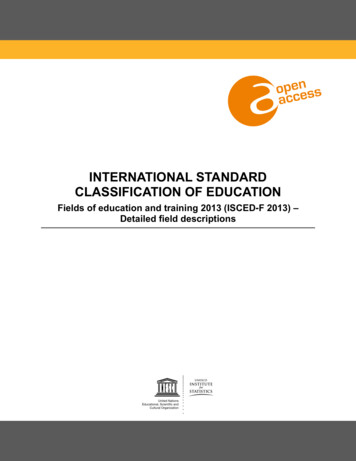
Transcription
INTERNATIONAL STANDARDCLASSIFICATION OF EDUCATIONFields of education and training 2013 (ISCED-F 2013) –Detailed field descriptions
UNESCOThe constitution of the United Nations Educational, Scientific and Cultural Organization (UNESCO) was adopted by20 countries at the London Conference in November 1945 and entered into effect on 4 November 1946. TheOrganization currently has 195 Member States and 9 Associate Members.The main objective of UNESCO is to contribute to peace and security in the world by promoting collaboration amongnations through education, science, culture and communication in order to foster universal respect for justice, the ruleof law, and the human rights and fundamental freedoms that are affirmed for the peoples of the world, withoutdistinction of race, sex, language or religion, by the Charter of the United Nations.To fulfil its mandate, UNESCO performs five principal functions: 1) prospective studies on education, science, cultureand communication for tomorrow's world; 2) the advancement, transfer and sharing of knowledge through research,training and teaching activities; 3) standard-setting actions for the preparation and adoption of internal instrumentsand statutory recommendations; 4) expertise through technical co-operation to Member States for their developmentpolicies and projects; and 5) the exchange of specialised information.UNESCO is headquartered in Paris, France.UNESCO Institute for StatisticsThe UNESCO Institute for Statistics (UIS) is the statistical office of UNESCO and is the UN depository for globalstatistics in the fields of education, science and technology, culture and communication.The UIS was established in 1999. It was created to improve UNESCO's statistical programme and to develop anddeliver the timely, accurate and policy-relevant statistics needed in today’s increasingly complex and rapidly changingsocial, political and economic environments.The UIS is based in Montreal, Canada.Published in 2015 by:UNESCO Institute for StatisticsP.O. Box 6128, Succursale Centre-VilleMontreal, Quebec H3C 3J7CanadaTel: 1-514-343-6880Email: rg UNESCO-UIS 2015ISBN 978-92-9189-179-5Ref: UIS/2015/INS/6DOI s publication is available in Open Access under the Attribution-ShareAlike 3.0 IGO (CC-BY-SA 3.0 IGO) 3.0/igo/). By using the content of this publication, the users accept to be bound by theterms of use of the UNESCO Open Access Repository a-en).The designations employed and the presentation of material throughout this publication do not imply the expression of any opinionwhatsoever on the part of UNESCO concerning the legal status of any country, territory, city or area or of its authorities orconcerning the delimitation of its frontiers or boundaries.
ContentsPageIntroduction . 400Generic programmes and qualifications . 501Education . 702Arts and Humanities . 1003Social Sciences, Journalism and Information . 1704Business, Administration and Law . 2005Natural Sciences, Mathematics and Statistics . 2506Information and Communication Technologies . 2907Engineering, Manufacturing and Construction. 3108Agriculture, Forestry, Fisheries and Veterinary . 3909Health and Welfare . 4310Services . 48Appendix I.ISCED-F 2013: List of possible codes . 54Appendix II.Numerical code list . 59Appendix III. Alphabetical list . 80- iii -
IntroductionThe International Standard Classification of Education (ISCED) is a framework for assembling,compiling and analysing cross-nationally comparable statistics on education. ISCED is amember of the United Nations International Family of Economic and SocialClassifications and is the reference classification for organizing education programmes andrelated qualifications by levels and fields of education. First developed in the mid-1970s by theUnited Nations Educational, Scientific and Cultural Organization (UNESCO), ISCED has beenrevised several times, including in both 2011 and 2013.The revision in 2011, concentrated primarily on changes to the levels of education ofprogrammes (ISCED-P) and introduced, for the first time, a classification of levels of educationalattainment based on qualifications (ISCED-A). The 2013 revision focused on the fields ofeducation and training (ISCED-F). The ISCED revisions arethe product of internationalagreement and are adopted formally by the General Conference of UNESCO Member States.The current document describes the subject content of each of the detailed fields of the 2013revision of the ISCED Fields of Education and Training classification (ISCED-F 2013). Wherepossible each description gives examples both of subjects which belong to each field and someboundary cases which are included in other fields. Such exclusions help to better distinguishone field from another especially where the content of two fields appears to be similar.At the end of the document there are alphabetical and numerical listings of subjects and fields.These lists include more examples of subjects than are mentioned in the field descriptionsthemselves.A summary of all possible field codes and their place in the classification hierarchy is alsoincluded.-4-
00 Generic programmes and qualificationsGeneric programmes and qualifications are those providing fundamental and personal skillseducation which cover a broad range of subjects and do not emphasise or specialise in aparticular broad or narrow field.This broad field should not be used as a residual category. Programmes and qualifications witha specific subject emphasis should be classified in broad fields 01 to 10. In particular,education at the tertiary level should only by way of exception be classified here.001 Basic programmes and qualifications0011Basic programmes and qualificationsBasic programmes and qualifications are designed to provide participants with fundamentalskills in reading, writing and arithmetic along with an elementary understanding of other subjectssuch as history, geography, natural science, social science, art and music, and in some casesreligious instruction. These programmes and qualifications are normally offered at primary andlower secondary levels. Broad, non-specialised programmes at upper secondary level are alsoclassified here even if there is some concentration on, for example, humanities, social science,natural science etc. Vocational programmes and qualifications are included here only by way ofexception.Programmes and qualifications with the following main subject content are classified here:Basic programmes and qualificationsBroad, generic (non-specialised) programmes and qualificationsGeneral programmes and qualifications with no specific subject emphasisProgrammes and qualifications at primary levelInclusionsBasic programmes and qualifications at upper secondary level (in some countries at lowersecondary level) with some emphasis on e.g. humanities, social sciences or natural sciencesbut still covering other fields of knowledge are included in this detailed field. In some countriessuch programmes or qualifications are offered on a modular basis and should also be classifiedhere.ExclusionsProgrammes that are considered as general in the programme orientation sense (nonvocational) but have a clear emphasis on a detailed, narrow or broad field are excluded fromthis detailed field and included in one of the broad fields 01-10, depending on the subjectcovered.-5-
002 Literacy and numeracy0021Literacy and numeracyLiteracy and numeracy are programmes or qualifications arranged mainly for adults, designedto teach fundamental skills in reading, writing and arithmetic. The typical age range ofparticipants can be used to distinguish between detailed field 0011 ‘Basic programmes andqualifications’ and this detailed field.Programmes and qualifications with the following main content are classified here:Basic remedial programmes for youth or adultsLiteracyNumeracy003 Personal skills0031Personal skillsPersonal skills are defined by reference to the effects on the individual’s capacity (mental,social etc.). This detailed field covers personal skills programmes not included in 0011 ‘Basicprogrammes and qualifications’ or 0021 ‘Literacy and numeracy’, giving key competencies andtransferable skills.Programmes and qualifications with the following main content are classified here:Argumentation and presentationAssertiveness trainingCommunication skillsCo-operationDevelopment of behavioural capacitiesDevelopment of mental skillsJob-seeking programmesParenting coursesPublic speakingSelf-esteem skillsSocial competenceTime managementInclusionsEducation and training in leadership in the context of personal development is included here.Education and training related to the work place or to work assignments is included in thisdetailed field if it has more to do with personal development than work development. Personalskills courses can be taught at the workplace, but still be classified here based on their content.Programmes for people with special needs on how to cope with their daily life are included hereExclusionsStudy of leadership in the context of management is excluded from this group and included indetailed field 0413 ‘Management and administration’.-6-
01 Education011 Education0111Education scienceEducation science is the study of the learning process and the theories, methods andtechniques of imparting knowledge to others.Programmes and qualifications with the following main content are classified here:Curriculum studiesDidacticsEducational assessment, testing and measurementEducational evaluation and researchPaedagogical sciencesExclusionsTeacher training programmes which combine education science with the practice of teachingare excluded from this detailed field and included in one of the detailed fields for teacher training(0112-0114).0112Training for pre-school teachersTraining for pre-school teachers is the study of the theories, methods and practice ofteaching very young children up to 7 years of age within formal school settings at pre-primary orearly childhood educational development levels.Programmes and qualifications with the following main content are classified here:Early childhood teaching (within formal school settings)Pre-primary teacher trainingExclusionsTraining in caring for children outside formal school settings is excluded from this detailed fieldand included in detailed field 0922 “Child care and youth services”0113Teacher training without subject specialisationTraining for teachers without subject specialisation is the study of the theories, methodsand practice of providing children between approximately 5 and 15 years of age with thefundamental skills in reading, writing and mathematics along with an elementary understandingof other subjects such as history, geography, social science etc. and laying the foundation forlifelong learning. Subject specialisation is stressed less than in detailed field 0114 ‘Teachertraining with subject specialisation’. The study of teaching children with special needs isincluded in this detailed field, likewise the study of teaching adults fundamental reading andwriting skills and teaching immigrants these types of skills in their home or first language.-7-
Programmes and qualifications with the following main content are classified here:Class teacher trainingIndigenous teacher trainingPrimary teachingTeacher training for children with special needsInclusionsThe study of teaching adults basic literacy and numeracy skills is included here. Teacher’s aide(teaching assistant) is also included here.ExclusionsTeacher training with subject specialisation even if intended for the teaching of children inprimary or lower secondary education is excluded from this detailed field and included indetailed field 0114 ‘Teacher training with subject specialisation’.0114Teacher training with subject specialisationTeacher training with subject specialisation is the study of the theories, methods andpractice of teaching a specific subject, mostly at secondary or higher levels of education.Programmes and qualifications included in this detailed field often comprise both studies as wellas the subject/subjects that are going to be taught.Programmes and qualifications with the following main content are classified here:Teacher training arts and craftsTeacher training commercial subjectsTeacher training musicTeacher training nursingTeacher training physical trainingTeacher training – second languagesTeacher training specific theoretical subjects, e.g. English, mathematics, historyTeacher training technical subjectsTeacher training – vocational subjectsTraining of driving instructorsTraining of trainersInclusionsTeacher training courses for university teachers, instructors of work place and working life skillsand in practical and artistic subjects are included here.ExclusionsTraining of sports trainers is excluded from this detailed field and included in detailed field 1014‘Sports’.-8-
018 Inter-disciplinary programmes and qualifications involving education0188Inter-disciplinary programmes and qualifications involving educationInter-disciplinary programmes and qualifications to which the greatest intended learning time isdevoted to education are classified here.-9-
02 Arts and Humanities021 Arts0211Audio-visual techniques and media productionAudio-visual techniques and media production is the study of techniques and skills toproduce books or newspapers, radio or TV production, film or video production, recorded musicproduction and graphic reproduction. It includes programmes and qualifications in methods ofcolour reproduction, photography and computer graphics. Study of combining pictures, wordsand decorations in the production of books, magazines, posters, adverts etc. is also included.Programmes and qualifications with the following main content are classified here:AnimationBookbindingCamera operatingCompositing (printing)Computer game productionComputer type-settingFilm and video productionGraphic designGraphic reproductionIllustrationInteractive media designMedia techniquesMultimedia productionPhotographyPre-press operationsPrint finishing and bindingPrintingPublishing design, lay-outRadio and TV productionRecorded music productionSound techniquesType-settingInclusionsDesktop publishing and lay-out are included here.ExclusionsProgrammes and qualifications in the use of specific software applications for desktoppublishing and website development are excluded from this detailed field and included indetailed field 0611 ‘Computer use”.Study of journalism (wording and content of messages) is excluded from this detailed field andincluded in detailed field 0321 ‘Journalism and reporting’.- 10 -
0212Fashion, interior and industrial designFashion, interior and industrial design is the study of creatively combining line, form andfabric in designing and constructing e.g. fashion garments, industrial products and interiors.Programmes and qualifications with the following main content are classified here:Costume designDesign of industrial productsFashion designInterior architectureInterior designStage designingWindow dressingExclusionsStudy of Building design is excluded from this detailed field and included in detailed field 0731‘Architecture and town planning’.Study of Industrial design is excluded from this detailed field if emphasis is given to technicalsubjects and not to artistic design, and included in the appropriate detailed field under 071‘Engineering and engineering trades’.Publishing design and graphic design are excluded from this detailed field and included indetailed field 0211 ‘Audio-visual techniques and media production’.0213Fine artsFine arts is the study of visual forms of creative expression, dealing with theory, history,techniques, performance and production in fine arts.Programmes and qualifications with the following main content are classified here:Art theoryCalligraphyEtchingFine art printmakingHistory of artPaintingPhilosophy of artSculptureExclusionsTraining in ceramics, pottery etc is excluded from this detailed field and included in detailed field0214 ‘Handicrafts’.Study of architecture is excluded from this detailed field and included in detailed field 0731‘Architecture and town planning’.Teacher training in arts is excluded from this detailed field and included in detailed field 0114‘Teacher training with subject specialisation’.- 11 -
0214HandicraftsHandicrafts is the study of techniques and skills in a chosen craft, such as jewellery, pottery,weaving, woodcarving etc.Programmes and qualifications with the following main content are classified here:CeramicsCrafts, folk arts and artisanDecorative metal craftsIndigenous craftsEmbroideryFloristry (flower arranging)Glass arts and craftGoldsmithingJewelleryMaking of musical instruments (not industrial)Musical instruments (repairing and tuning)SilversmithingStone carving (craft)Weaving (craft)WoodcarvingExclusionsStudy of industrial (large scaled mechanised) production of pottery, woven materials,embroidery etc. is excluded from this field and included in one of the detailed fields under broadfield 07 ‘Engineering, manufacturing and construction’.0215Music and performing artsMusic and performing arts is the study of the principles and techniques associated withperformance involving music, speech, movement, mime, characterisation, improvisation andstage craft.Programmes and qualifications with the following main content are classified here:Acting and directingBalletChoreographyCircusComposition (music)Conducting (music)Creative and performance artDanceDramaHistory of film and theatreHistory of musicMusicMusic conductingMusicologyTheatre/Theatre sciences- 12 -
InclusionsStudy of music and performing arts history and theory is included here.ExclusionsTeacher training in music and other performing arts is excluded from this detailed field andincluded in detailed field 0114 ‘Teacher training with subject specialisation’.022 Humanities (except languages)0221Religion and theologyReligion and theology is the study of religious beliefs, concepts, symbols, expressions andtexts of spirituality.Programmes and qualifications with the following main content are classified here:Religious historyStudy of sacred booksStudy of different religionsTheologyInclusionsIncluded in this detailed field are programmes for children and young people, usually given inreligious schools or seminars, in monasteries etc., aiming to develop an interest in the tenets oftheir religion and sufficient familiarity with its philosophy to assist in the propagation of their faith.ExclusionsBasic programmes given in religious schools, seminars etc. containing religious instruction butnot emphasising it or leading to a religious vocation, are excluded from this detailed field andincluded in 0011 ‘Basic programmes and qualifications’. Islamic sharia programmes andqualifications are excluded from this detailed field and included in detailed field 0421 ‘Law’.0222History and archaeologyHistory is the study of past events, especially the political, social and economic development ofa country, a continent or the world. History of medicine is classified here, likewise the study ofhistory of science and ideas. Archaeology is the study of ancient civilisations by scientificanalysis of what is found in the ground.Programmes and qualifications with the following main content are classified here:ArchaeologyCultural historyFolklore studiesHistoryHistory of literatureHistory of medicineHistory of science and ideasHistory of technology- 13 -
InclusionsRestoration and preservation of artistic heritage are included here.ExclusionsStudy of literature combined with study of a specific language is excluded from this detailed fieldand included in detailed field 0232 ‘Literature and linguistics’.Study of classical languages (Latin etc.) is excluded from this detailed field and included indetailed field 0231 ‘Language acquisition’.Study of History of art is excluded from this detailed field and included in detailed field 0213‘Fine arts’.Study of Music and performing arts history is excluded from this detailed field and included indetailed field 0215 ‘Music and performing arts’.Study of Economic history/history of economics is excluded from this detailed field and includedin detailed field 0311 ‘Economics’.0223Philosophy and ethicsPhilosophy and ethics is the study of philosophy, ethics and related subjects dealing with theconception of life.Programmes and qualifications with the following main content are classified here:EthicsLogicMoralsPhilosophyExclusionsStudy of religion is excluded from this detailed field and included in detailed field 0221 ‘Religion’.Study of Philosophy of arts is excluded from this detailed field and is included in detailed field0213 ‘Fine arts’023 Languages0231Language acquisitionLanguage acquisition is the study of the structure and composition of languages taught assecond or foreign languages (i.e. that are intended for non-native or non-fluent speakers of thelanguage). It includes the study of related cultures, literature, linguistics and phonetics if relatedto the specific language being acquired and forms part of the same programme or qualification.Classical or dead languages are included here as it is assumed there are no native speakers ofthe language and hence the manner of teaching and the content of the curriculum are moresimilar to the teaching of foreign languages.- 14 -
Programmes and qualifications with the following main content are classified here:Classical languagesExogenous languagesForeign languagesInterpretationPhoneticsSecond languages, for example English as a second languageSign languageSign language interpretingTranslationInclusions:Language and linguistics studies are included here if the linguistics are related to a specificlanguage or languages being acquired and forming part of the same programme or qualification.Translation and interpretation are included here.Exclusions:The study of the mother tongue or first language (i.e. that are intended for native, fluent orcompetent speakers of the language), even if this language is not a national language of thecountry of study (e.g. programmes for immigrants learning their mother tongue) are excludedfrom this detailed field and included in detailed field 0232 ‘Literature and linguistics’.0232Literature and linguisticsLiterature and linguistics is here defined as the study of language(s) intended for native,fluent or competent speakers of the language. It includes the study of related literature andlinguistics and may or may not include the structure and composition of the language.Programmes and qualifications with the following main content are classified here:Creative writingFirst languageIndigenous languagesLinguisticsLiterature“Mother tongue” languagesNative first languagesInclusionsLanguages taught as the first language (“mother tongue”), even if the language is not thenational language of the country of study (e.g. programmes for immigrants in their home or firstlanguage) are included here. Local and regional languages are included here if they are firstlanguages spoken by a significant minority in the country and are intended for at leastcompetent speakers of the language.Study of comparative literature is included here. Study of general linguistics (not related to thestudy of a particular language) is included here. Study of literature in general (not combined withstudy of a special language) is included here.- 15 -
ExclusionsLanguage programmes are excluded from this detailed field if the language is taught as aforeign or a second language, and are then included in 0231 ‘Language acquisition’.Programmes in literacy and numeracy are excluded from this detailed field and included indetailed field 0021 ‘Literacy and numeracy’.Sign language programmes are excluded from this detailed field and included in detailed field0231 ‘Language acquisition’.028 Inter-disciplinary programmes and qualifications involving arts and humanities0288Inter-disciplinary programmes and qualifications involving arts and humanitiesInter-disciplinary programmes and qualifications to which the greatest intended learning time isdevoted to arts and humanities are classified here.- 16 -
03 Social Sciences, Journalism and Information031 Social and behavioural sciences0311EconomicsEconomics is the study of economic policy, economic theory and economic decisionmaking.Programmes and qualifications with the following main content are classified here:EconometricsEconomic historyEconomicsPolitical economicsExclusionsStudy of economics where emphasis is given to business studies is excluded from this detailedfield and classified under 041 ‘Business and administration’. Study of home economics isexcluded from this detailed field and included in the detailed field 1011 ‘Domestic services’.0312Political sciences and civicsPolitical sciences and civics is the study of government and political principles or practice.The study of the rights and duties of the citizens are included here.Programmes and qualifications with the following main content are classified here:CivicsHuman rightsInternational relationsPeace and conflict studiesPolitical historyPolitical sciencePublic policy studiesExclusionsStudy of political economics is excluded from this detailed field and included in the detailed field0311 ‘Economics’.0313PsychologyPsychology is the study of the human mind and behaviour as a result of individual differences,experience and environment.Programmes and qualifications with the following main content are classified here:Cognitive sciencePsychoanalysisPsychologyPsychotherapy- 17 -
0314Sociology and cultural studiesSociology and cultural studies is the study of human beings and the way they behave ingroups and in relation to society. The study of ethnology and social anthropology are includedhere, likewise the study of human and social geography.Programmes and qualifications with the following main content are classified here:CriminologyCultural geographyCultural studiesDemography/population studiesEthnologyGender studiesSocial anthropologySociologyExclusionsSocial welfare where emphasis is given to practical social work is excluded from this detailedfield and included in detailed field 0923 ‘Social work and counselling’.Physical geography is excluded from this detailed field and included in detailed field 0532 ‘Earthscience’.032 Journalism and information0321Journalism and reportingJournalism and reporting is the study of the theory and practices of journalism/reporting aspart of the field of mass communication. Journalism and reporting is about the wording andcontent of messages. It comprises news reporting, writing commentaries and feature stories ofpublic interest etc.Programmes and qualifications with the following main content are classified here:Broadcast journalismEditingInformation (wording and content)JournalismMass communication (wording and content)News reportingExclusionsStudy of techniques for mass communication (e.g. printing and radio/TV production) is excludedfrom this detailed field and included in detailed field 0211 ‘Audio-visual techniques and mediaproduction’.Study of lay-out and publishing design is excluded from this detailed field and included indetailed field 0211 ‘Audio-visual techniques and media production’.- 18 -
Study of public relations is excluded from this detailed field and included in detailed field 0414‘Marketing and advertising’.0322Library, information and archival studiesLibrary, information and archival studies is the study of the methods of selecting, acquiring,organizing and storing collections of information, and facilitating the use of information. Museumand library studies are included here.Programmes and qualifications with the following main content are classified here:Archival sciencesCuratorial studiesDocumentationInformation scienceLibrary studiesMuseum documentationMuseum studiesMuseologyExclusionsRestoration and preservation of artistic heritage are excluded from this field and included in field0222 ‘History and archaeology’.038 Inter-disciplinary programmes and qualifications involving social sciences,journalism and information0388Inter-disciplinary programmes and qualifications involving social sciences,journalism and informationInter-disciplinary programmes and qualifications to which the greatest intended learning time isdevoted to social scien
Assertiveness training Communication skills Co-operation Development of behavioural capacities Development of mental skills Job-seeking programmes Parenting courses Public speaking Self-esteem skills Social competence Time management Inclusions Education and training in leadership
